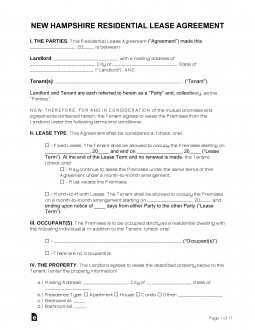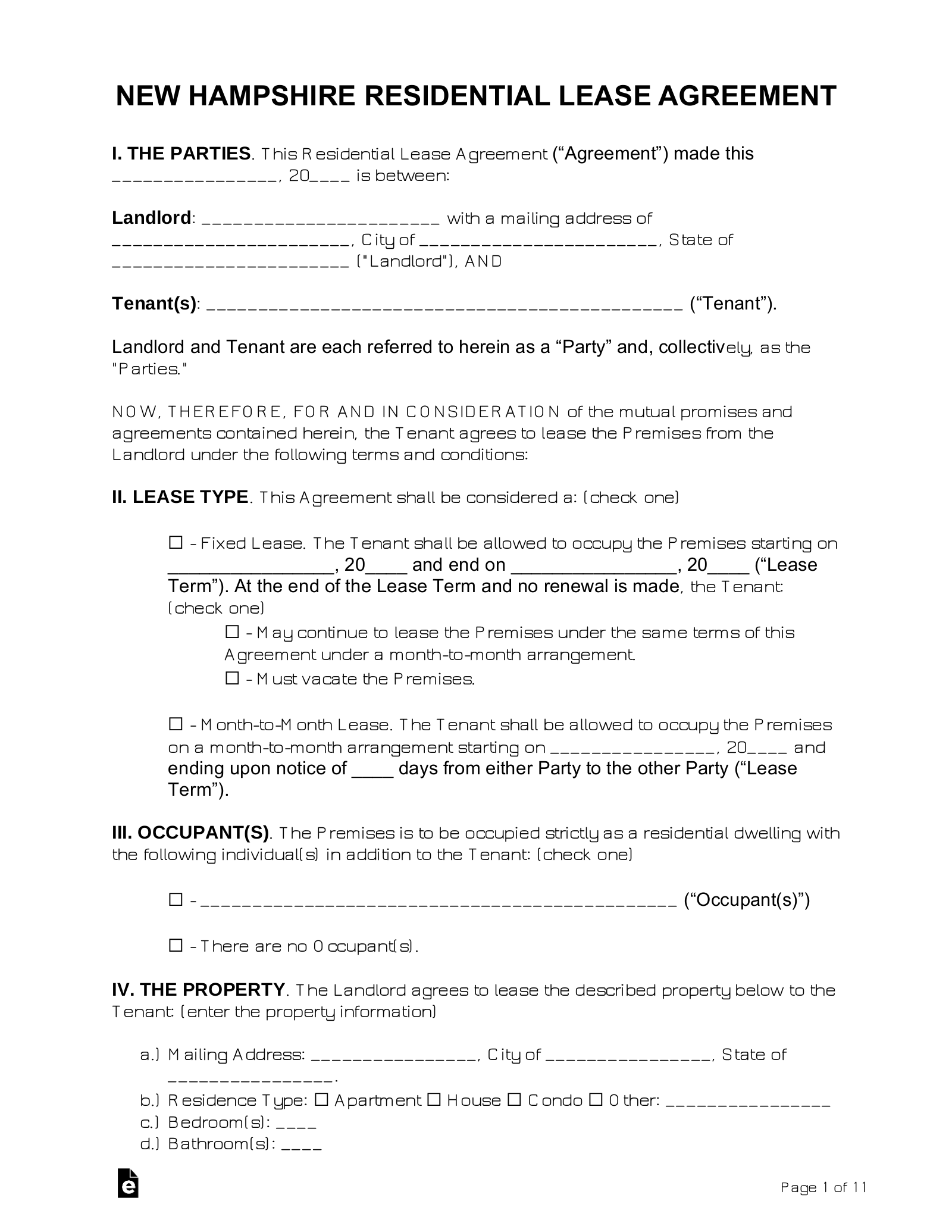Updated February 19, 2024
A New Hampshire lease agreement binds a landlord and a tenant to a rental contract that outlines the rent and the responsibilities of each party. A lease may be used for residential or commercial property. A landlord will commonly verify the tenant’s credit report and income before authorizing an agreement.
Table of Contents |
Agreement Types (6)
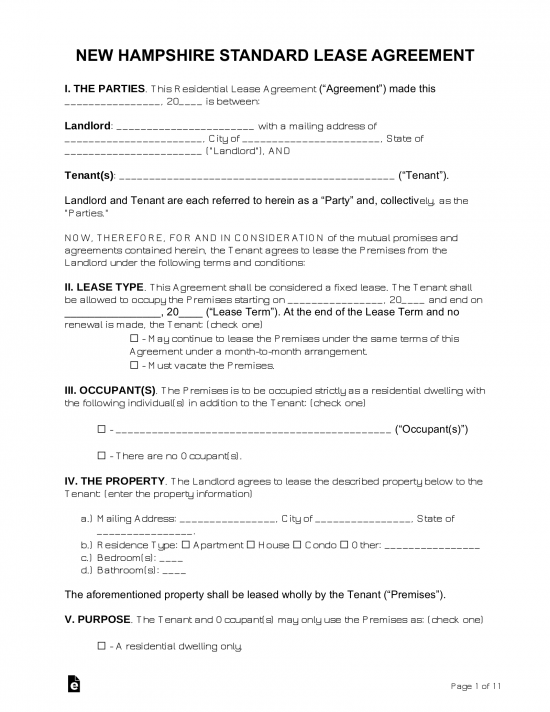 Standard Residential Lease Agreement – Fixed term for any type of livable arrangement. Standard Residential Lease Agreement – Fixed term for any type of livable arrangement.
Download: PDF, MS Word, OpenDocument |
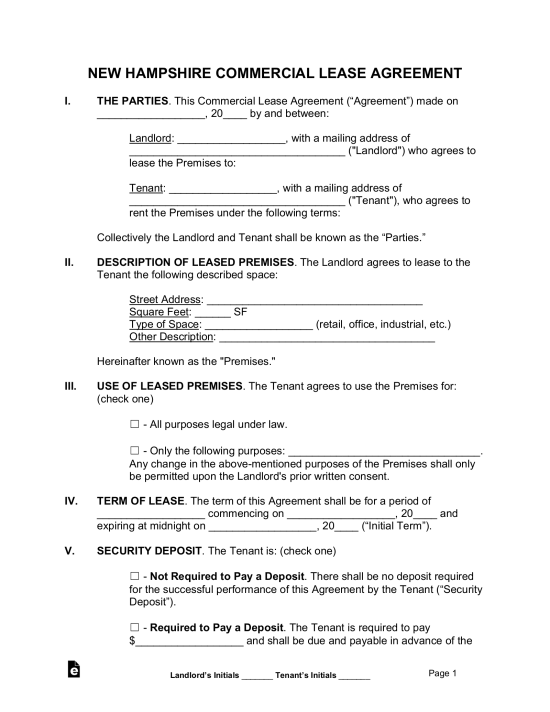 Commercial Lease Agreement – For the use of office, retail, or industrial purposes. Primarily space for a business to operate. Commercial Lease Agreement – For the use of office, retail, or industrial purposes. Primarily space for a business to operate.
Download: PDF, MS Word, OpenDocument |
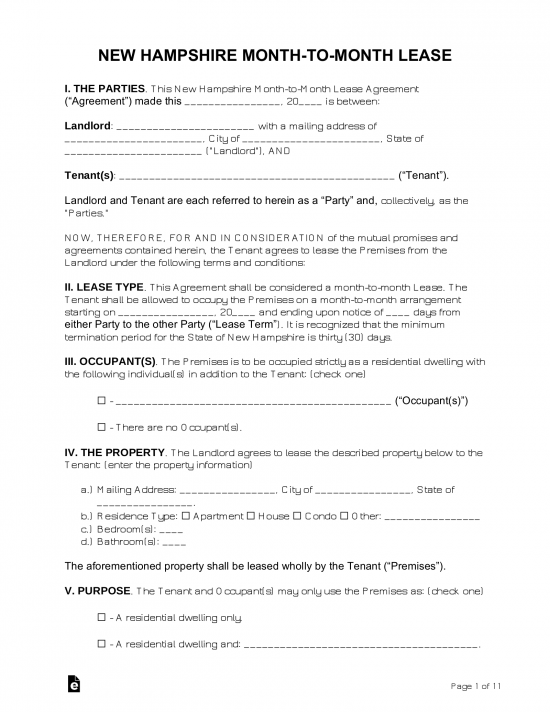 Month-to-Month Lease Agreement (§ 540:11(2)) – All tenancies-at-will may be canceled upon receipt from one party, landlord or tenant, to the other in the amount of 30 days prior to the next payment date. Month-to-Month Lease Agreement (§ 540:11(2)) – All tenancies-at-will may be canceled upon receipt from one party, landlord or tenant, to the other in the amount of 30 days prior to the next payment date.
Download: PDF, MS Word, OpenDocument |
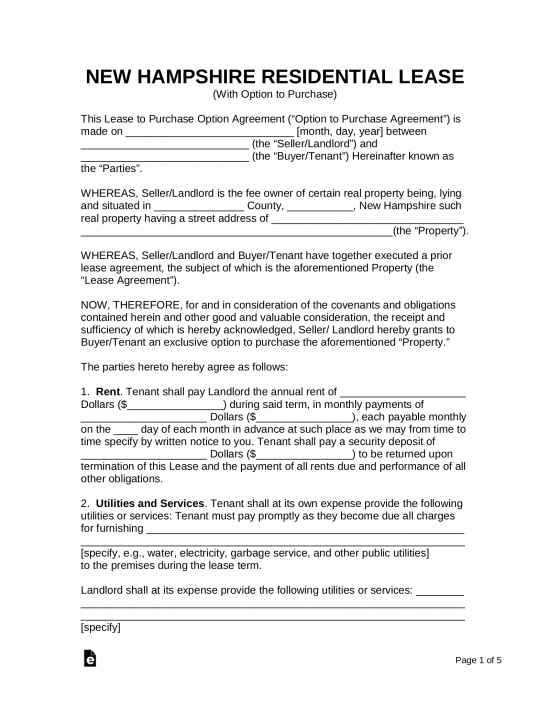 Rent-to-Own Lease Agreement – Standard contract for habitable dwelling with a provision added for the buying of the premises. Rent-to-Own Lease Agreement – Standard contract for habitable dwelling with a provision added for the buying of the premises.
Download: PDF, MS Word, OpenDocument |
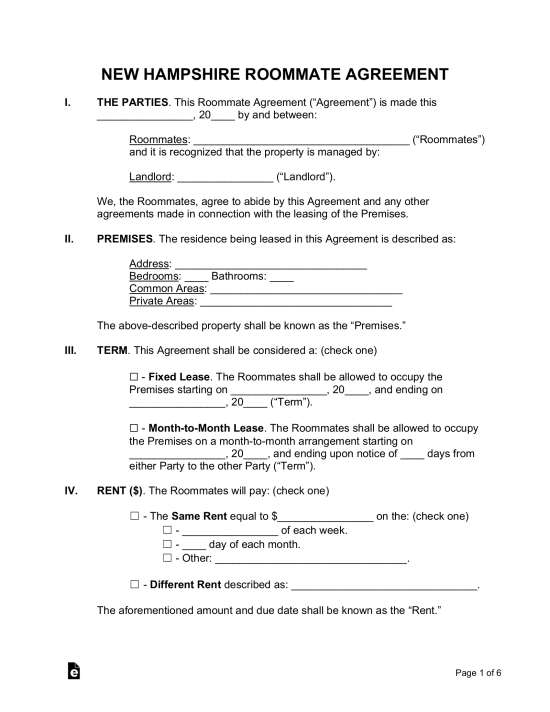 Room Rental (Roommate) Agreement – An accord between the members of a shared living facility. Room Rental (Roommate) Agreement – An accord between the members of a shared living facility.
Download: PDF, MS Word, OpenDocument |
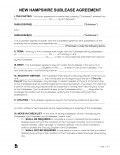 Sublease Agreement – Tenant that decides to rent their living unit to another individual (known as the “subtenant”). Usually, this requires consent from the landlord/agent. Sublease Agreement – Tenant that decides to rent their living unit to another individual (known as the “subtenant”). Usually, this requires consent from the landlord/agent.
Download: PDF, MS Word, OpenDocument |
Required Disclosures (4)
- Copy of Lease – The landlord is required to give a copy of the signed lease to the tenant within 30 days.[1]
- Lead-Based Paint Disclosure – If a residence was constructed before 1978, the landlord is required to inform their tenants of the potential presence of this hazardous paint.
- Move-in Checklist – The landlord must give written notice to the tenant that a written list of all repairs needed on the premises must be given to the landlord within five days of the beginning of occupancy.[2]
- Security Deposit Receipt (conditional) – Unless the tenant makes this payment via check, the landlord must provide a receipt stating the amount of the deposit and identifying the financial institution where the money is being held.[3]
Security Deposits
Maximum Amount – The landlord may ask for up to one month’s rent or $100, whichever is greater.[4]
Collecting Interest – The landlord must pay interest on the deposit at a rate equal to the interest paid on regular savings accounts in the New Hampshire bank, savings and loan association, or credit union where they have deposited the tenant’s payment.[5]
Receipt – The landlord must provide the tenant with a written receipt for the security deposit, unless the tenant pays the deposit with a check.[3]
Returning – The landlord must return the deposit to the tenant within 30 days, unless the tenant shares the property with the landlord. In that case, unless there is a written agreement stating otherwise, the funds must be returned within 20 days.[6]
- Itemized List – If the landlord deducts any amount of the security deposit to cover the costs of repairs to the unit, they must provide the tenant with a written, itemized list of the damages and necessary repairs.[6]
When is Rent Due?
Grace Period – Rent is due on the date established in the lease agreement; there is no grace period for the late payment of rent in New Hampshire. If rent is not paid the day after rent is due, the landlord may serve a seven-day notice to quit.[7]
Maximum Late Fee – New Hampshire state law does not establish a maximum late fee. The landlord can charge any amount, provided that amount is mentioned in the lease.
NSF Fee – The landlord may charge a maximum fee of $25 if the tenant pays rent with a bad check.[8]
Withholding Rent – If the tenant withholds rent in order to pay for utility services that the landlord had previously agreed to pay for and has failed to provide, then the landlord may not evict the tenant for the nonpayment of that rent.[9]
Right to Enter (Landlord)
Standard Access – The landlord has the right to enter the property to make repairs or perform other necessary functions, provided they have given reasonable notice to the tenant.[10]
Immediate Access – The landlord may enter the property without the consent of the tenant in order to make emergency repairs or address an infestation of bed bugs, rodents, or other pests.[11]
Abandonment
Absence – If the tenant has removed their personal property from the unit and has failed to pay rent for more than 91 days, then the landlord may presume that the tenant has abandoned the premises.[12]
Breaking the Lease – A member of the armed services who is called to active duty or reassigned to a location out of the state may terminate the rental agreement without penalty.[13]
Tenant’s Utility Shutoff – If the tenant’s failure to maintain essential utilities on the property constitutes a breach of a material term of the lease, then the landlord may terminate the tenancy and give 30 days’ notice to vacate.[7]
Unclaimed Property – The landlord must reasonably store any personal property left behind by the tenant for at least seven days, after which time the landlord may dispose of the property without notice to the tenant.[14]

